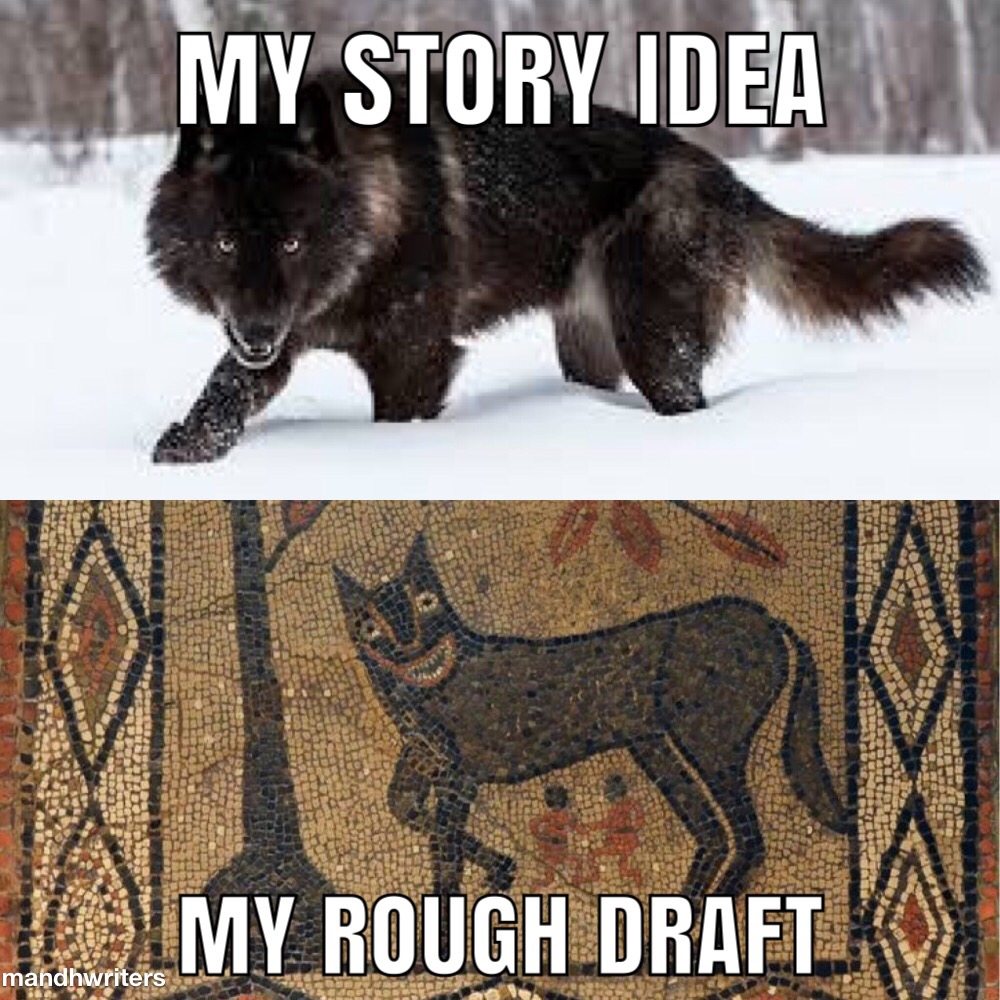Whether or not you participate, there are useful NaNoWriMo lessons and insights to discover each year, in the writing community’s discussions, celebrations and lamentations on writing. Read 9 NaNoWriMo insights applicable to all writers:
1. Get a head start on writing while motivated
Writing to a contest submission or publisher’s deadline, or your own? It pays to make as much progress as you can while your motivation is high.
Jennifer Cohen, writing for Forbes, says ‘motivation is like a muscle’, in that we have to strengthen and build it the same way – through repeat practice.
We asked members of our 2019 NaNoWriMo writing group if they had any tricks to stay productive and reach the 50, 000-word target. One member shared this:
A trick of sorts was trying to get ahead as much as I could in week one, specifically day one. On that day, I wrote 6006 words. But as to staying productive, I just had a lot of free time.
2. Enlist the power of peer support
Writing is a lonely process. Yet it doesn’t have to be. A writing buddy – someone you check in with, discuss ideas and challenges with, or even just share word counts with, keeps you accountable.
This social side to motivation is important. It’s the same reason joining a park run is often more motivating then running solo. The outpouring of support on tweets such as these add extra pleasure to the achievement of finishing a writing sprint like NaNoWriMo:
It’s easier to stay accountable when you feel part of a committed community.
It’s the same principle at work in author coaching. The motivator of having someone else checking in. Now Novel’s writing coaches shared that several of the aspiring authors they work with managed to write 50, 000 words over November, bringing their finished first drafts much closer.
3. Use the time you have
For many aspiring authors, writing is a passion squeezed into stolen moments. NaNoWriMo lessons about time management are everywhere. Another member of our 2019 NaNoWriMo group shared this:
I’m trying, I’m a little behind, but the weekends I’m storming like 3k a day, so I’m hoping that Thanksgiving break will give me time to actually get on task and even possibly ahead.
Many authors have spoken on the necessity of working smart. The late, brilliant Toni Morrison trained herself to wake before her household so she had time to write:
Writing before dawn began as a necessity—I had small children when I first began to write and I needed to use the time before they said, Mama—and that was always around five in the morning.
Toni Morrison, interviewed by Elissa Schappell in ‘The Art of Fiction No. 134’,
Author and Now Novel coach Nerine Dorman has a tip for breaking your writing time into three manageable stints per day writing in the time that you have.
Whether it’s a free weekend or a quiet, dawn hour, use whatever available time you have to create, imagine and explore.
4. Accept imperfections
Remember to be playful about crazy ideas (such as writing 50, 000 words in a month). Many writers dismiss NaNoWriMo for this reason, protesting “You can’t write anything good in one month!”
Yet ‘good’ isn’t necessarily the point.
Treat writing events like NaNoWriMo as a game. See how much more you can write than yesterday, for example. Because even if you don’t ‘win’ a writing sprint, you practiced the key muscles in writing: focus, perseverance, productivity, intention, creation. These are gains.
Taking a playful approach to a rough or first draft gives your imagination permission to roam, your SPAG permission to be wrong. Often the early days of a project are true to this meme, and that’s absolutely fine:

5. Practice resilience
So much of writing requires resilience. Seeing your sleek, wolverine story idea become the ‘derpy’ mosaic as in the meme above, for example, could be discouraging. The same goes for not meeting the word count you imagined. Or, at the querying stage, receiving more form rejections than personal replies.
Practicing resilience means patting yourself on the back for the effort you did make, the progress you have made. It’s recognising your commitment and rewarding it, like Jess Lawrence says in this tweet:
6. Celebrate others’ successes
One of the great joys of writing (and reading) is connecting with other writers. Whether through their words on the page or through social media, writing and book expos, conferences, launches and events.
The achievements of others are great fodder for our own dreams and aspirations. Inspiration is easy to find when we’re part of something bigger than just ourselves. Many of NaNoWriMo’s participants shared this ethos of celebrating, encouraging and taking comfort in each other’s progress:
7. See the funny side
It’s easy to become despondent when we find ourselves repeating frustrating patterns such as procrastination or crippling self-criticism.
Yet posts about NaNoWriMo are full of the wisdom of laughing at our own foibles, too:
8. Treat every writing project as a learning exercise
Many authors have described in interviews how their first attempts at writing a novel were so terrible they locked them away in deep drawers, never to see daylight again.
We often think first drafts or first attempts must be feasible or publishable. Because they take so much work. Yet the work itself is the win – one of the greatest NaNoWriMo lessons – as it’s an opportunity to learn answers to important questions. Questions such as:
- How does a story work?
- Why does a story fail?
- Who do I write for?
- What do I want to say?
- How will I work smarter next time?
The more you practice writing, the clearer these answers become. Or the questions you ask shift, becoming even more interesting and fun to explore.
9. Plan your next steps
The NaNoWriMo insights you gain by participating or even just joining in discussion around the event are useful for planning next steps. See, for example, all the participants who will use their December breaks to revise or extend what they’ve created?
Put together a revision or rewriting schedule for yourself so that you keep up your progress. The greatest win of all is developing the discipline and the resilience to persevere, and to enjoy storytelling without the pressure of high or unrealistic expectations.
Plan your next story in easy prompts and join a supportive community of writers.
And once you’ve finished your NaNoWriMo project, you might want to take a look at how to edit it. We have some great tips for doing so.

